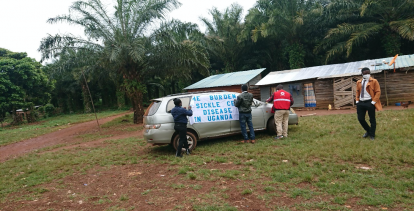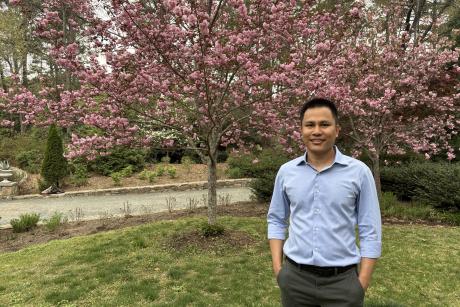Members of the Duke-Uganda Student Research Training (SRT) team reflect on their summer project working on community-engaged research and outreach on sickle cell disease in Kalangala, Uganda.
You might not remember where you were on June 19, 2021, but we will.
The United Nations has designated June 19 as World Sickle Cell Awareness Day. Sickle cell disease (SCD) – a genetic blood disorder with high morbidity and mortality rates – affects millions of people globally, with the greatest burden lying in sub-Saharan Africa. On average, 300,000 children are born with sickle cell disease each year and, of those born in Africa, only half will survive past their 5th birthday.
On June 19, 2021, in Bwamba, Uganda – a small fishing community on the southern tip of Bugala Island in Lake Victoria – our Kalangala team members engaged in an educational outreach event for World Sickle Cell Day in the hopes of encouraging the community to fight SCD stigma in their home area.

Sickle cell awareness activities in...
Isolated and home to a small population (~200 adults), the community rarely attracts outsiders to host community-wide activities and events. Bwamba is around a 40-minute drive from Kalangala.
While technologies targeting SCD are becoming increasingly funded and available, there is still a need for community-based research in communities like Bwamba in order to assess their awareness of the disease, along with possible treatments, and acceptability and feasibility of interventions.
Our Kalangala team members identified Bwamba for outreach because no other organization had yet to do so. Bwamba is largely neglected in health education and access, and the Kalangala team felt strongly that the community would be willing to receive and participate in this event.
On the day of the event, extra safety protocols had to be set in place because of the country-wide surge in COVID-19. Kalangala team members used this as an opportunity to not only raise awareness about SCD, but also COVID-19 and they discussed burdens, causes, prevalence, transmission, prevention and control, and management of both diseases.
Children were taken into their own groups during the community event, both to allow the adults to concentrate on their program and also to informally clinically screen the children for SCF through observation of their well-being and physical health. Like their parents, children were also educated about SCD and COVID-19. As a seeming sign of success, the children expressed interest in the topics and asked further questions about what they were being taught.
Overall, our event was a collaborative success, largely made possible by the members of the Bwamba community themselves. Their engagement and participation were highly valuable and encouraging for implementing future events within this community, as well as at other sites. The SRT team as a whole (both Duke and Ugandan undergraduate students) planned the event together over daily Zoom meetings; however, the Kalangala-based team members were vital to planning, organizing, and carrying out the event, along with advertising the event in the local community. Through efforts that involved remote and global collaboration, along with Bwamba community members’ trust in the Kalangala-based team, the World Sickle Cell Day event was an encouraging leap toward combating SCD In the Kalangala district.
While the event did not come without challenges – including new regulations from Uganda’s president regarding COVID-19 and the Kalangala team’s vehicle breaking down the day of the event – community members were overwhelmingly satisfied with the event. Aside from the fact that a large number of people attended and actively participated, one child in Bwamba was identified and recruited for the Sickle Cell Clinic in Kalangala. And, this event was so much of a success that none of the attendees requested food or drink; an almost impossible occurrence for an event of this kind, according to the Kalangala team.
While most may not remember June 19, 2021 as an important day in their lives, our team will remember it well as a day that hopefully made a lasting impact on the fight against SCD.
Members of the Uganda SRT team include Duke students Joan Ac-Lumor, Afreen Ashraf, Cydney Livingston and Arthi Vaidyanathan, along with program directors Joel Kibonwabake and Kearsley Stewart; MS-GH student Dorothy Nam; senior researcher Catherina Nazziwa; and Uganda-based team members Benon Kyakuwa, Brian Herbert, Caroline Nambwere, Ellen Namagembe and Joan Perroni Namata.

Sickle cell awareness activities in...



